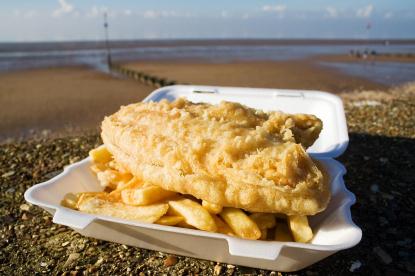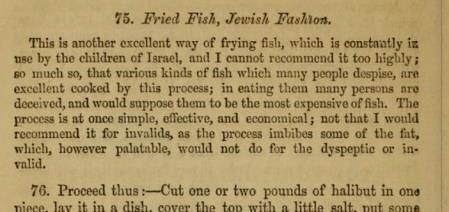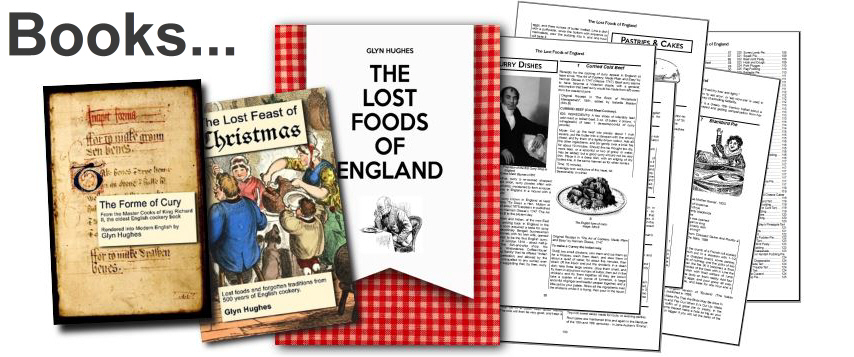

|
  Photo: Andrew Dunn The centrepiece of fish-and-chips. Strips of filleted fish deep-fried brown and crispy in a thick, frothy wheatflour batter seems to have its origin in Sephardic (Spanish) Jewish cookery and remains a popular Kosher dish, sometimes prepared in advance and served cold to avoid the prohibition on cooking on Shabbat.  The 19th Century London writer Israel Zangwill wrote in ‘Children of the Ghetto‘ of; “Fried Fried fish, and such fried fish! Only a great poet could sing the praises of the national dish, and the golden age of Hebrew poetry is over.” It is known in the former Jewish area of southern Spain as ‘Pescado Sofrito a la Judia’ and appears to have gained popularity in England following the huge increase in Jewish businesses, including food shops, after the religious emancipation of 1829. Indeed, one of two contenders for ‘first fish-and-chip shop‘, Joseph Malin’s in Cleveland Street, London, advertised in the 1860’s as offering ‘fish fried in the Jewish fashion’. Soyer 1845 (below) gives the receipt which is exactly that used in chip shops today.  Original Receipt in Soyer’s A Shilling Cookery for The People, 1845; Original Receipt in Soyer’s A Shilling Cookery for The People, 1845;75. Fried Fish, Jewish Fashion. This is another excellent way of frying fish, which is constantly in use by the children of Israel, and I cannot recommend it too highly; so much so, that various kinds of fish which many people despise, are excellent cooked by this process; in eating them many persons are deceived, and would suppose them to be the most expensive of fish. The process is at once simple, effective, and economical; not that I would recommend it for invalids, as the process imbibes some of the fat, which, however palatable, would not do for the dyspeptic or invalid. 76. Proceed thus:- Cut one or two pounds of halibut in one piece, lay it in a dish, cover the top with a little salt, put some water in the dish, but not to cover the fish; let it remain thus for one hour. The water being below, causes the salt to penetrate into the fish. Take it out and dry it; cut out the bone, and the fins off; it is then in two pieces. Lay the pieces on the side, and divide them into slices half an inch thick; put into a frying pan, with a quarter of a pound of fat, lard, or dripping (the Jews use oil); then put two ounces of flour into a soup-plate, or basin, which mix with water, to form a smooth batter, not too thick. Dip the fish in it, that the pieces are well covered; then have the fat, not too hot, put the pieces in it, and fry till a nice colour, turning them over. When done, take it out with a slice, let it drain, dish up, and serve. Any kind of sauce that is liked may be used with it; but plain, with a little salt and lemon, is excellent. This fish is often only threepence to fourpence per pound; it containing but little bone renders it very economical. It is excellent cold, and can be eaten with oil, vinegar, and cucumbers, in summer time, and is exceedingly cooling. An egg is an improvement in the batter. The same fish as before mentioned as fit for frying, may be fried in this manner. Eels are excellent done so; the batter absorbs the oil which is in them. Flounders may also be done in this way. A little salt should be sprinkled over before serving. 77. In some Jewish families all this kind of fish is fried in oil, and dipped in batter, as described above. In some families they dip the fish first in flour, and then in egg, and fry in oil. This plan is superior to that fried in fat or dripping, but more expensive. Many of the above-mentioned families have stated days on which they fry, or stew their fish, which will keep good several days in summer, and I may almost say, weeks in winter; and being generally eaten cold, it saves them a deal of cooking. Still, I must say that there is nothing like a hot dinner. See: Fish Beer Battered Fish Chip-Shop Fried Fish Cod’s Head (and shoulders) Deep Fried Fish Fish and Chips Fried Fish in Crumb  |
|
MORE FROM Foods of England... Cookbooks ● Diary ● Index ● Magic Menu ● Random ● Really English? ● Timeline ● Donate ● Royalty ● English Service ● Food Map of England ● Lost Foods ● Accompaniments ● Biscuits ● Breads ● Cakes and Scones ● Cheeses ● Classic Meals ● Curry Dishes ● Dairy ● Drinks ● Egg Dishes ● Fish ● Fruit ● Fruits & Vegetables ● Game & Offal ● Meat & Meat Dishes ● Pastries and Pies ● Pot Meals ● Poultry ● Preserves & Jams ● Puddings & Sweets ● Sauces and Spicery ● Sausages ● Scones ● Soups ● Sweets and Toffee ● About ... ● Bookshop ● Email: [email protected] COPYRIGHT and ALL RIGHTS RESERVED: © Glyn Hughes 2022 BUILT WITH WHIMBERRY |